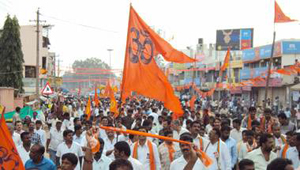Mangaluru, Jul 11: The local units of Bharatiya Janata Party and other saffron outfits have warned state government and police department of major agitation if the Sangh Parivar leaders, booked in connection with stone-pelting incident during the funeral procession of slain RSS worker Sharath Madivala on Saturday, were arrested.
 Cases have been registered at Bantwal Town Police Station against BJP Backward Classes Morcha state secretary Satyajit Surathkal, BJP Yuva Morcha district president Harish Poonja, Bajrang Dal state convener Sharan Pumpwell, Hindu Hitarakshan Samithi convener Muralikrishna Asanthadka and Pradeep Pumpwell.
Cases have been registered at Bantwal Town Police Station against BJP Backward Classes Morcha state secretary Satyajit Surathkal, BJP Yuva Morcha district president Harish Poonja, Bajrang Dal state convener Sharan Pumpwell, Hindu Hitarakshan Samithi convener Muralikrishna Asanthadka and Pradeep Pumpwell.
The five ‘instigators’ have been booked under stringent Sections of IPC 143 (punishment for unlawful assembly), 147 (punishment for rioting), 148 (rioting, armed with deadly weapon), 149 (every member of unlawful assembly guilty of offence committed in prosecution of common object), 188 (disobedience to order duly promulgated by public servant), 308 (attempt to commit culpable homicide), 353 (assault or criminal force to deter public servant from discharge of his duty)., 427 (mischief causing damage), 504 (intentional insult with intent to provoke breach of the peace) read along with 2(a).
Besides, BJP MPs Shobha Karandlaje, Nalin Kumar Kateel, Karkala MLA Sunil Kumar and RSS leader Kalladka Prabhar Bhat and another 1,000 persons have also been booked under IPC Sections 143, 147 and 188.
Strongly condemning the move of police, leaders of BJP, Vishwa Hindu Parishat (VHP), Hindu Jagaran Vedike (HJV) in a joint press meet on Mondayaccused the government of pressurize the police to arrest “innocent Hindu leaders”
They demanded sacking of district minister Ramanath Rai in the wake of recent incidents of violence in Dakshina Kannada and warned that they will hold a massive protest if cases filed against Hindutva leaders are not withdrawn. They also alleged that some Kerala-based organizations and criminals are disrupting peace in Bantwal.
BJP district president Sanjeeva Matandoor said that the state government is inept at controlling law and order and hence it has imposed Section 144 in Bantwal for the last 45 days and rest of the four taluks from the past three weeks. MLC Ganesh Karnik also voiced similar opinion saying this is the first time in the history of the district that prohibitory orders are in place for 45-long days. He blamed Rai as all the untoward incidents reported from his constituency.
HJV president Kishore Kumar also warned of protest if cases filed against Satyajit Suratkal are not withdrawn. Satyajit's wife Savitha Suratkal alleged that around 50 police barged into her house at 2am on Monday in search of her husband and that too without a woman police, which is against the law.
VHP leader Jagadessha Shenava wanted a branch of NIA to be opened in DK to thwart the advances of communal forces based in Kerala in the district.




Comments
Oh My God, very shocking news.
Y they took these hard steps.?? Any way Suicide is not the final solution. If any body get any problem just read the life story of some great personalities. It give you method of solutions.
In Islam it is sinful act..
RIP.
Suicide is not a solution for any problem....very sad!
RIP!
Do not end your life if you are depressed. Read Quran in your language and understand the creator. If you cant then just talk to Muslim scholar in nearby Masjid. Hope that will give you permanent relief. In Sha Allah. I request all Muslim brothers and sisters to take care of your neighbors and friends specifically non-muslims.
assalamu alaikum ,
sir main hujjaj kiram ki khidmat dil se karna chahta hoon please mujhe mauqa dein.
jazak ALLAH khair
Mob.: 8604887808
VERY SAD !!!!
look at them very happy family was, simply did like this.
Add new comment